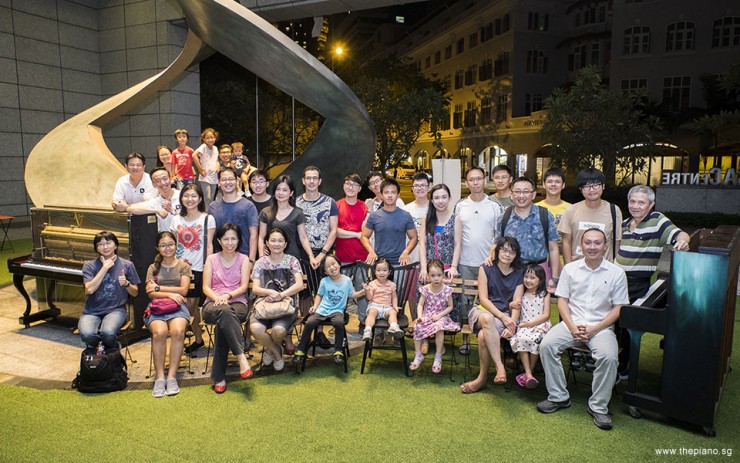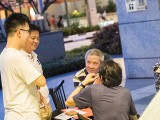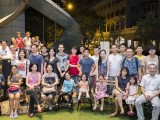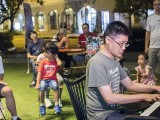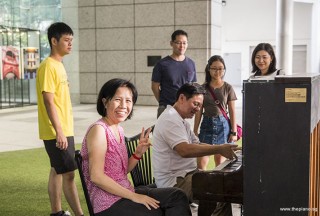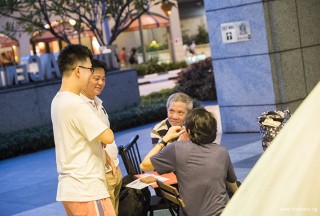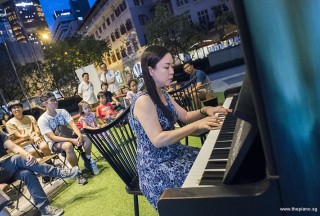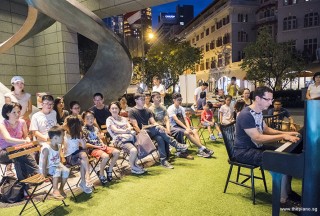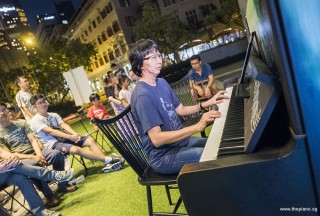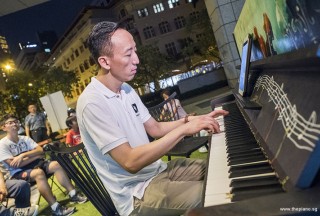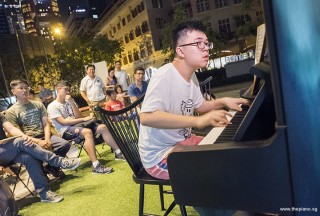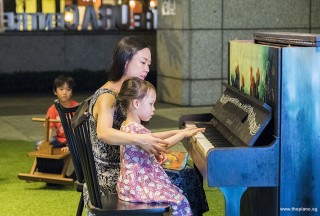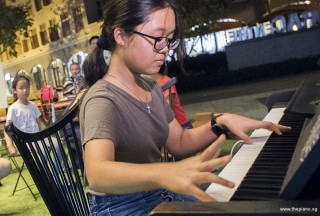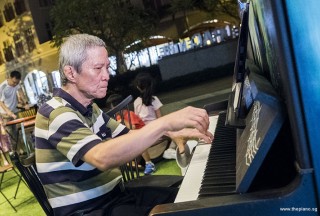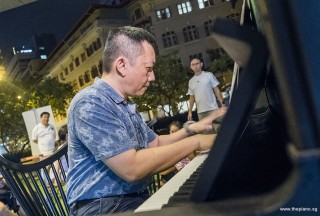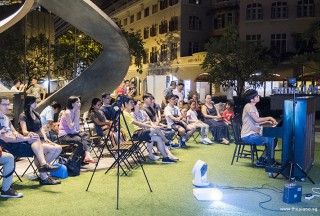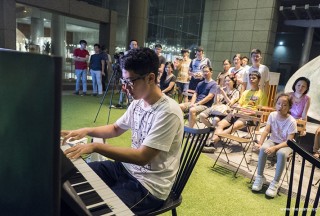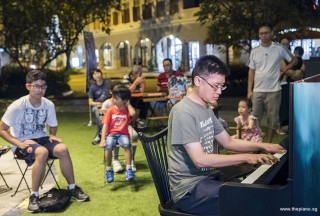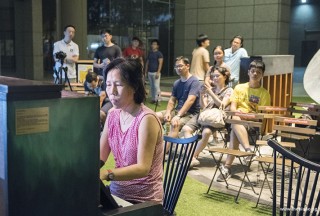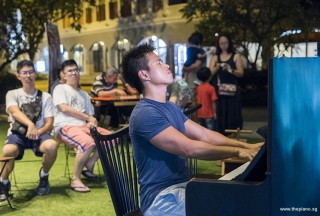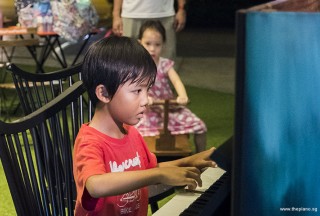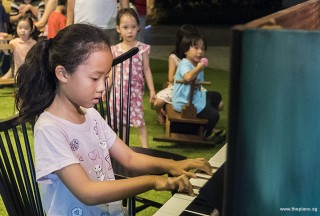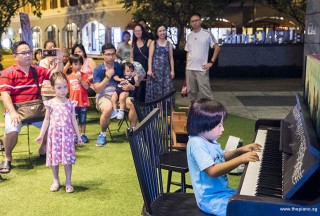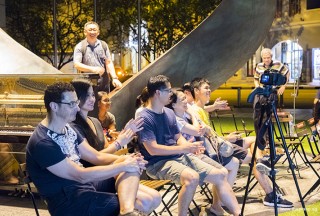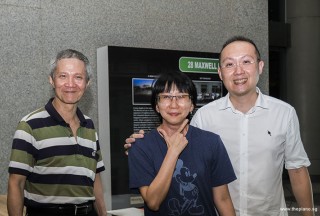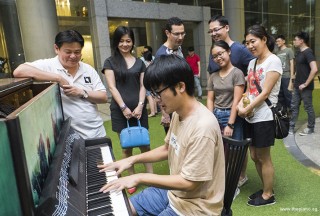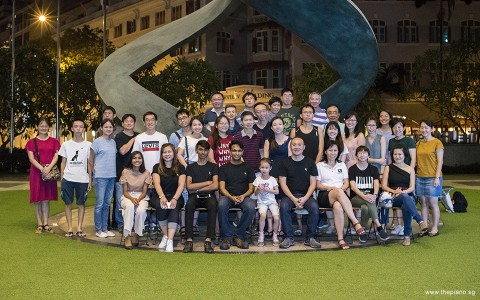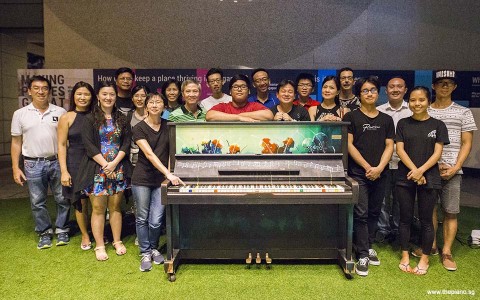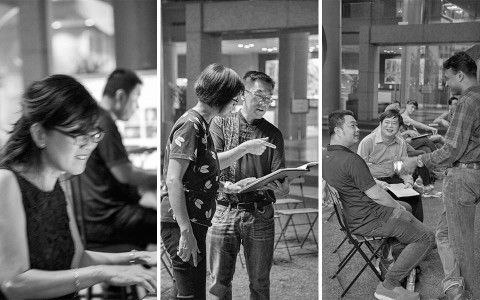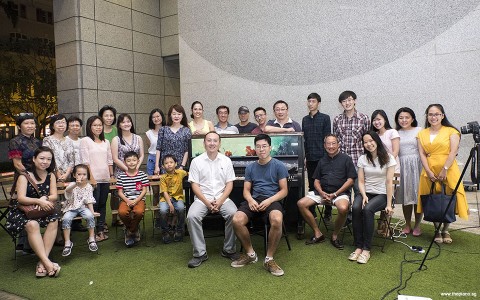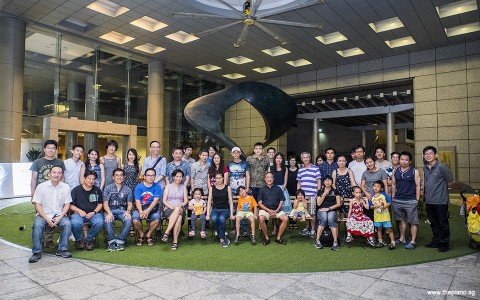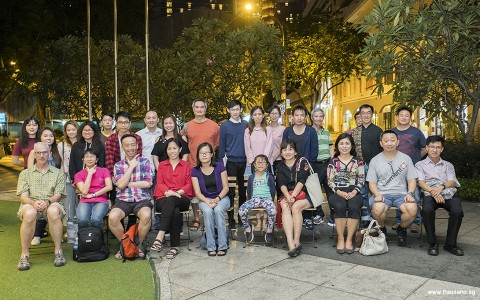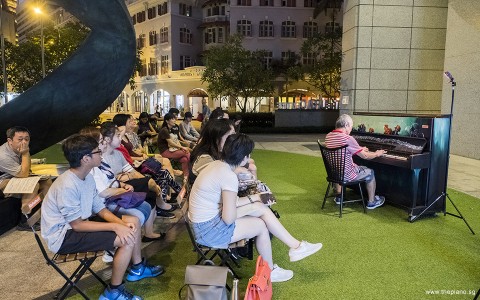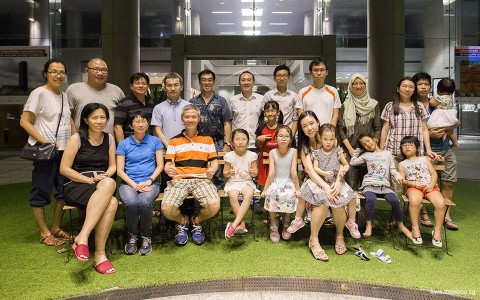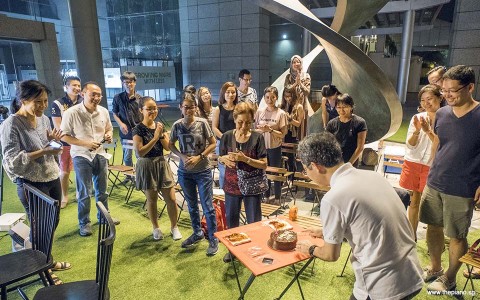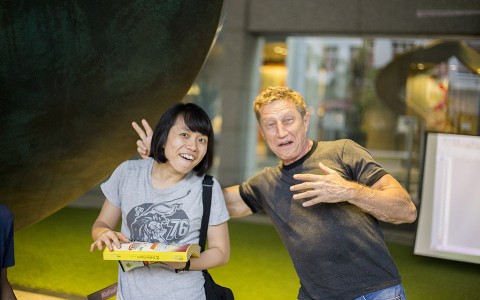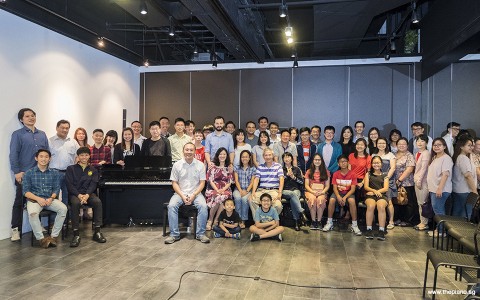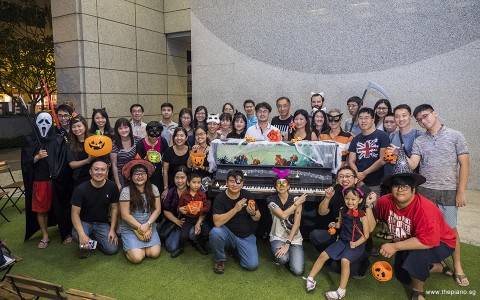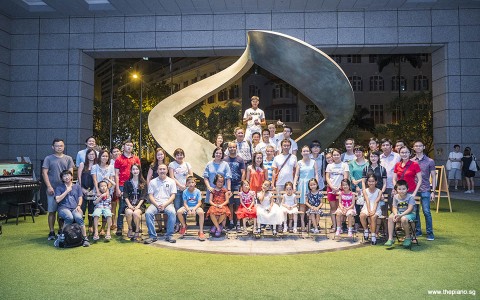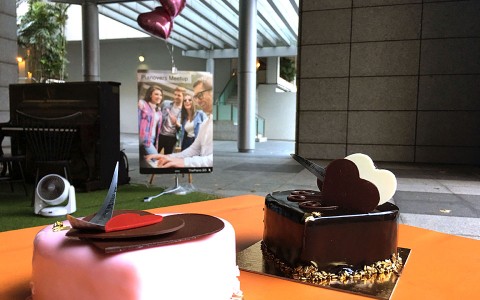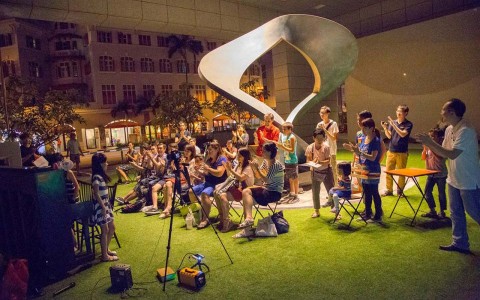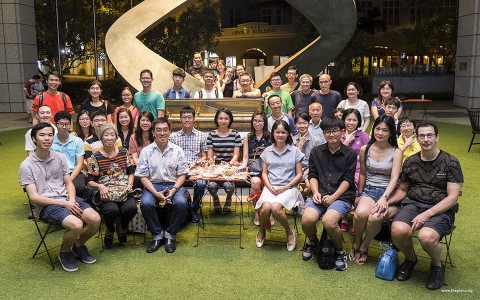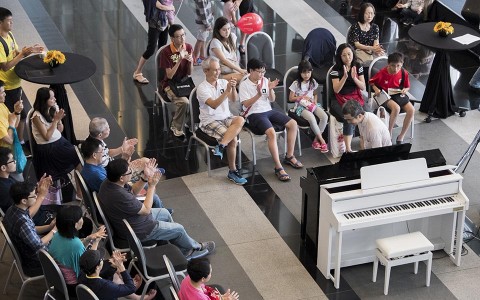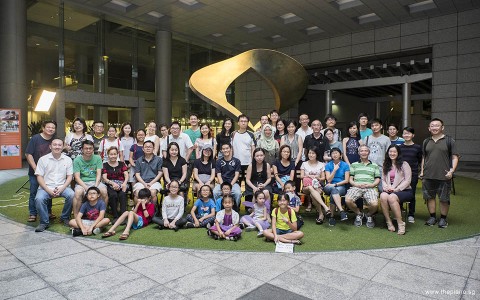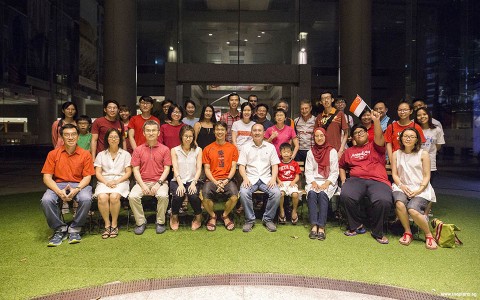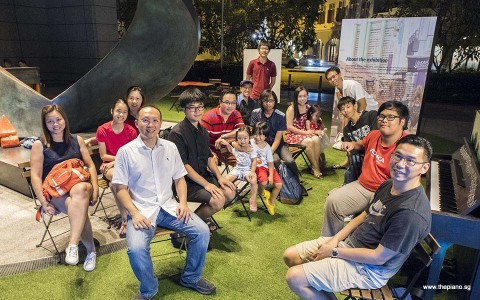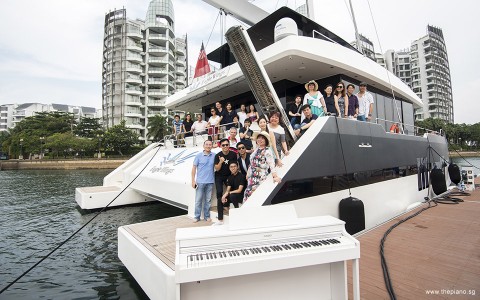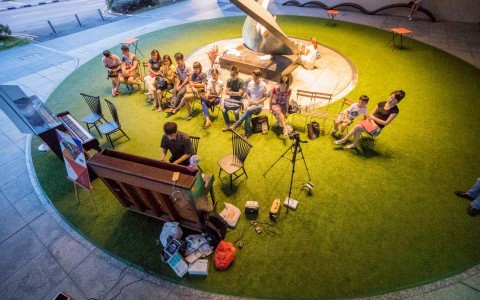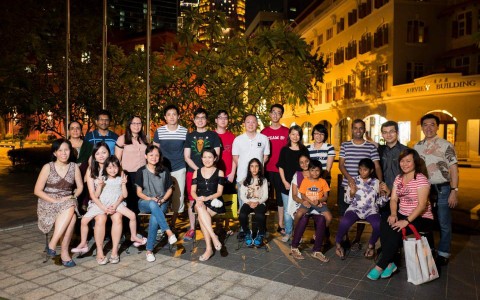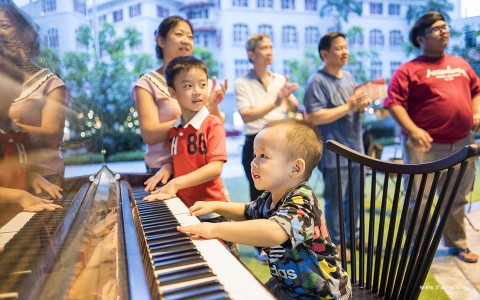ThePiano.SG aims to build an inclusive community of piano lovers in Singapore and has been holding weekly Pianovers Meetups at The URA Centre for the past year and a half. Each week, people from all backgrounds gather here to play the piano and listen to piano music, as well as to network.
This evening, Heng Loong, Yu Chen and May Ling met Sng Yong Meng, ThePiano.SG’s Founder, for dinner at Maxwell Road Food Centre. It is always useful to bond over delicious food and this evening was no different! Heng Loong and Yu Chen were newcomers and would go on to perform that evening.
Following dinner, Yong Meng gave an introduction of ThePiano.SG to the attendees and described its vision, mission and activities. The idea was to allow the Pianovers – our affectionate name for piano lovers – to understand what we stand for and have a sense of belonging to the community. As they waited for the lights at The URA Centre to turn on, Pianovers interacted with one another. We are heartened that people openly share their knowledge with one another. Music transcends all boundaries!
Jenny was the first to perform in the Mini-Recital segment this evening. She played Vincent by Don McLean. This song is also known by its opening line, “Starry, Starry Night”. This song was inspired by "The Starry Night", a painting by the world-famous painter Vincent Van Gogh, who lived in the 19th century. Apart from mentioning this painting, which is one of the most recognised paintings in Western culture and shows the view from Van Gogh’s asylum room, the song also describes other famous works by the artist.
David was next up at the piano and played Impromptu in C minor, Op. 90 No. 1 by Franz Schubert. The Impromptus were written in 1827 for the solo piano. They were published in two sets of four impromptus each. The first two pieces in the first set were published as Op. 90 while Schubert was still alive. The second set, however was published posthumously as Op. 142 in 1839.
Our regular Pianover, Siew Tin, performed 龙的传人 (meaning Legend of the Dragon) by 侯德健. This song was written as a way to reflect the composer's thoughts when the United States switched recognition from Taiwan to China in late 1978.
Teik Lee performed Wake Me Up When September Ends by Billie Joe Armstrong. This song was released in 2005 and tells an account of Armstrong’s father who died of cancer in September 1982 when Armstrong was only ten. The song’s music video conveys the theme of loss by showing a couple broken by the Iraq War, where the man was serving as a US Marine Corp and got ambushed while discharging his duties. This song gained symbolism when it was used to honour victims of the Hurricane Katrina disaster as well as the September 11 attacks in New York City.
In a departure from the usual procedure, Yong Meng shared the background of the song while Teik Lee played the song, the second time, as background music. The use of music to help narrate the tale touched Pianovers, as could be seen by how one Pianover cried during the sharing session.
Zhi Yuan went up to the piano next and performed "Symphony No. 25 in G minor" by Mozart. This song was written in 1773 when Mozart was only 17 and the first movement is used as the opening music in Miloš Forman's film "Amadeus". Although Mozart wrote a total of 41 symphonies, this one was known as the “Little G Minor Symphony” as it was one of the only two written in this key. It was found out in recent years that Mozart had written a whopping 68 symphonies, not just 41 as was popularly believed. However, the original numbering was retained, and No. 41 is today known as Mozart’s last symphony. Our Pianover, Zhi Yuan, has recently passed his DipABRSM piano examination. We are all very happy for him! All the best going forward, Zhi Yuan!
I-Wen played three pieces tonight, Twinkle Twinkle Little Star, Jingle Bells and Honeybee March. Jingle Bells was published in September 1857 under the title "One Horse Open Sleigh" and performed in Boston that year. It was originally intended for the Thanksgiving season but over the years became associated with Christmas instead. Today, Jingle Bells is a popular Christmas song sung by families around the world.
Erika performed "The Maiden's Prayer" by Tekla Bądarzewska-Baranowska. This piece was published in 1856 in Warsaw. Interestingly, this song is used in Taiwan when garbage trucks move around in neighbourhoods. The melody from "The Maiden’s Prayer" is used as a jingle to inform residents to bring out their garbage.
Albert played two pieces tonight, "相思河畔" and "河边春梦" by 周添旺. The song was originally performed by Japanese singer 松原静韵. Unfortunately, he was unable to articulate Chinese words well and this song never became popular. It was not until the 1950s when it gained traction, thanks to a movie inspired by a 1950 murder case and involving a girl named 陈素卿. The movie was named after the song and even used the song as its theme music. What made the story captivating is the plot. What looks like a suicide at the beginning is actually a meticulously-planned murder case.
Gavin was up at the piano next and he played Hungarian Rhapsody No. 2, Lassan by Liszt. This song was used in one of the Tom and Jerry cartoons, named The Cat Concerto which was released in 1947 and goes further than most other cartoons where piano music is concerned. This episode actually features Tom the cat donning a suit and appearing in a concert hall. This cartoon has educational value and it introduces young viewers – and some older ones, too, undoubtedly! – to not only classical music but also the internal workings of a piano. "The Cat Concerto" is so well known that Lang Lang, the famous Chinese pianist who has performed with leading global orchestras, once revealed that it was through listening Hungarian Rhapsody in The Cat Concerto that inspired him to start learning the piano at two.
Jaeyong played two pieces by Paul McCartney and John Lennon, Yesterday and Let It Be. "Yesterday" was composed in 1965 and is still popular today, and holds the record of having more than 2,200 cover versions. It's also a melancholic romantic song that laments the break-up of a relationship. The singer yearns for the past when he and his lover were still together.
Yuchen played Etude in A minor, Op 25, No. 11 by Chopin. This piece is often referred to as “Winter Wind”. Chopin wrote a total of 27 etudes during his lifetime. As one Internet User commented on a YouTube video performance of this piece, "When you're listening to up to 15 sec of the piece and you're like - I think I could learn some piano and play this - then Chopin crushed your future hopes and dreams as cold as the winter wind." Indeed, this etude is technically challenging, and is used as both a study for developing stamina, dexterity and technique, as well as a study of right hand dexterity and left hand flexibility, which are essential skills for any concert pianist.
Heng Loong performed two pieces, Waltz in A minor, No. 19 (posth.) by Chopin and The Entertainer by Scott Joplin. Joplin, also known as The King of Ragtime Writers, was an African-American composer and pianist. One of his compositions, "Maple Leaf Rag", rose to prominence as one of his most popular ragtime pieces and actually provided him steady income for the rest of his life. In the later part of his life, Joplin performed "The Entertainer". Unfortunately, it did not become quite as popular as "Maple Leaf Rag".
May Ling performed three pieces this evening, "The Christmas Song" by Bob Wells and Mel Tormé, "All I Want For Christmas Is You", as well as "Grown-Up Christmas List" by David Foster. "Grown-Up Christmas List" was originally recorded by Foster for his 1990 non-holiday album "River of Love". However, in 1992, Amy Grant did her own version for her album, "Home for Christmas". Today, it is Grant’s version that most people associate with the song.
Edward performed Sonata in E minor, Op. 90, No. 27, 1st movt by Beethoven. While most of Beethoven’s piano sonatas contained three or four movements, this composition, which was dedicated to Prince Moritz von Lichnowsky, Beethoven’s friend and benefactor, has only two. Two of the movements were meant to be titled Kampf zwischen Kopf und Herz ("A Contest Between Head and Heart") and Conversation mit der Geliebten ("Conversation with the Beloved"). As can be seen from the titles, the sonata referred to Prince Moritz' romance with a woman he was thinking of marrying.
Next at the piano was Gabriel, who played Au Claire de la Lune, which means “By the Light of the Moon”. This piece is a French folk song from the 18th century. Owing to its simple melody, it is often taught to beginners who are learning a new instrument. This song is not to be confused with "Clair de Lune", the third and most famous movement of Suite bergamasque, in D♭ major, by Debussy. This song was inspired by Verlaine's poem Clair de Lune, ("moonlight" in French). This piece belonged to the era of French Impressionism, the 19th century art movement and was written in 9/8 meter, marked andante très expressif (very expressive), and played mostly pianissimo (very softly).
Genevieve played Ecossaise this evening. Genevieve is Gabriel’s sister and we are happy that she attended the Meetup with Gabriel, as well as their younger sister and both parents. We are glad that you and your family are now part of the Pianovers community and look forward to seeing you all again in future Meetup sessions!
Last but not least, Brandon performed Twinkle Twinkle Little Star and 世界有你会更美好. Mozart had composed a set of variations for solo piano based on the melody of "Twinkle Twinkle Little Star". This was known as Twelve Variations on “Ah, vous dirai-je, Maman” K. 265 and was published in Vienna in the 18th century.
Following the conclusion of the Mini-Recital, the Meetup moved into the Open Segment. Every week, this is a time for jamming, networking and sharing. As people jammed on the pianos, the audience clapped in encouragement. Tonight, Yong Meng also shared a photograph with Albert and Siew Tin, regular Pianovers who have been tirelessly helping to dismantle the equipment after every Meetup session, as well in many other small ways. Thank you, Albert and Siew Tin!
As Pianovers Meetup #61 concluded, it was time to say goodbye again. However, Pianovers are all eagerly looking forward to next Sunday’s session. See you all again at The URA Centre!
